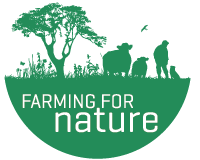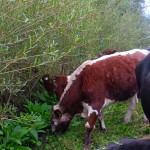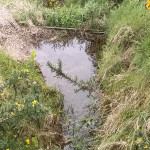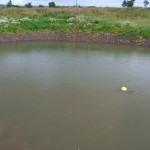Clive Bright
FARMING FOR NATURE AMBASSADOR 2019
Clive raises 100% pasture-fed organic beef on his 120-acre farm in Ballymote, Co.Sligo, and he sells his beef direct through his business ‘Rare Ruminare’. His livestock are a mix of traditional breeds such as Hereford, Shorthorn, Angus, Irish moil and Galloway, well suited to thrive on the farm’s species-rich grasslands. He uses Holistic Planned Grazing, an adaptive grazing rotation that gives pastures adequate time to recover between grazing events. Using ecological principles and monitoring, Holistic Planned Grazing also allows him to formulate a plan to have his animals in the right place at the right time for the right reasons. This management has dramatically increased the diversity on his farm. Working
with the land’s natural capacity and the right genetics, Clive has shown you don’t have to supplement the animals’ diet if you work with nature. Clive is a great advocate for Agroforestry – merging trees and agriculture. He says, “Woodland pasture or silvopasture is the ideal habitat for livestock, providing shelter and shade and a source of additional nutrients. Trees over pasture add another level of green leaves multiplying the amount of solar energy the land captures; this enhances the mineral and water cycle and restores soil health, bolsters biodiversity and the overall resilience and productivity of the farm”. Over the last few years, ponds and wetland creation have become an integral part of Clive’s farm. He rationalises that if all life requires water, we should try to harness and cycle every drop that falls on the farm. From simple measures like making slit traps in old drains to new pond construction, holding water in the landscape and allowing it to soak deep into the soil rather than draining it away is his goal. Most of his wetland features have multiple uses, like slowing water down in the landscape, wildlife habitats, and reservoirs for livestock drinking water.
NOMINATION:
Clive is an organic farmer in Co. Sligo. His business model is 100% grass-fed organic beef from livestock that are free to graze in species-rich swards. His brand is called Rare Ruminare and on the farm, Clive has a mixture traditional breeds such as Hereford, Shorthorn and Angus. These breeds are selected for temperment and because they can make the best use of the farm's species-rich grasslands. Clive and his family take a holistic approach to farming, where livestock production, welfare and ecosystems are all of equal importance. Rare ruminare website - www.rareruminare.com
Nomination 1: Dolores Byrne, Ecologist, Sligo IT
Organic farmer, Clive Bright of Rare Ruminare , rears 100% pasture-fed beef and lamb on his 120-acre farm in south Sligo. Upon taking over his family farm in 2003, Clive had two goals in mind, firstly to find a way for his farm to make a profit and secondly to do it without compromising the environment. He tells of his first mentor, a German farmer Erwin Springbrunn who gave him the initial confidence to convert the farm to organic production. In later years Clive discovered the ideas of Permaculture and Holistic Management and his whole farming philosophy started to fall into place. Clive sees his farm as an ecosystem in which, the livestock are just one part. He sees his role as managing the animals, so they maintain a balance within their niche. "where nature thrives is a good place for a cow to live – it's that simple" he says. The ultimate goal is to design his farming model so he can virtually farm for free. "If you are truly farming in nature’s image, it shouldn't cost anything: the sun and soil grow grass, cows eat grass". Measures to enhance the farm ecosystem or increase ecosystem function are Clive's primary long term focus. He says building the farm resilience is the best investment and the fastest way to farm in the black. He believes establishing well-designed silvopastures, or woodland pastures are the future for his marginal land. "Rushes are the bane of farmers all over the North West, but they are just a symptom of a non-functioning water cycle in compacted clay soils. Rushes don't often grow within 10 metres of an established native tree, because the tree roots bore through compaction, and pump water from the soil all while building soil carbon, sheltering the animals and the pasture all while creating diverse habitat for hundreds of other species" Inter-pasture trees together with mob-grazing his cattle seems to be the ideal farming model for his land as it is both productive and a huge benefit to the environment. Mob grazing is a planned grazing framework wherein the animals are moved daily to new pasture and only graze grass that has fully recovered (at the 3-4 leaf stage). This dramatically increases the natural plant species diversity in the fields, as the sward is grazed relatively evenly, the whole sward gets to recover and compete equally. This model also ensures that because the animals are only allowed to eat "recovered" grass that Clive is always farming within the natural potential of the land. If the herd is too big and the rotation is too short the grass will not be recovered, become over-grazed, and the model will fail. Clive is adamant that his animals are adapted to the land, to mob-grazing and grass finishing. If animals are not naturally thriving, they are culled. This means the herd is healthy and easy to manage. The final part of Clive's enterprise is that he direct sells his pasture-fed beef.
Nomination 2: Sinead Moran, Founder, FOODTURE















